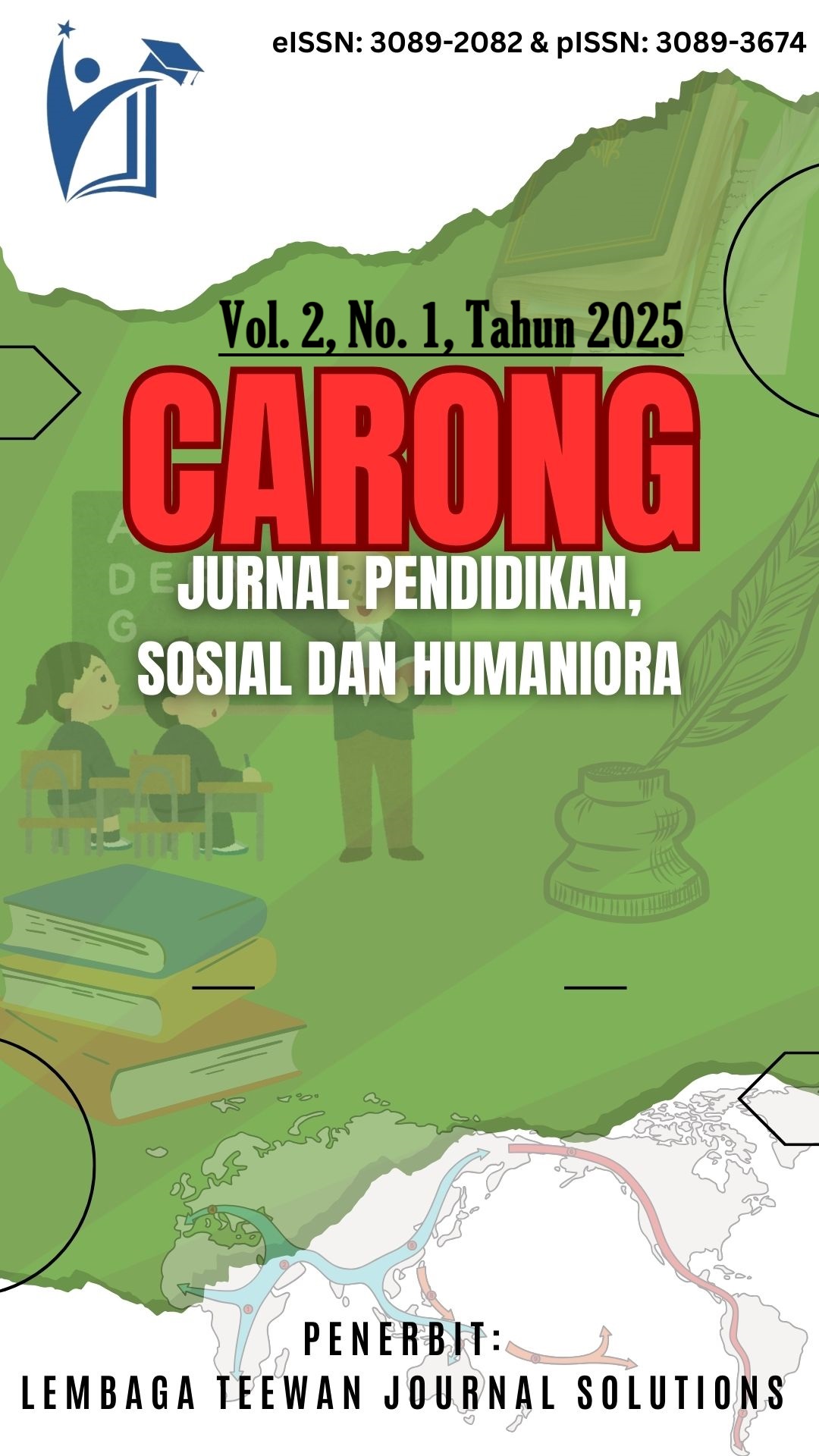Pengaruh Budaya Sekolah dan ICT Self-Efficacy Terhadap Kompetensi Technological Pedagogical Content Knowledge (TPACK) pada Guru
DOI:
https://doi.org/10.62710/zdz91m13Keywords:
Budaya Sekolah, ICT Self-Efficacy , Kompetensi Technological Pedagogical Content Knowledge (TPAC); , GuruAbstract
Transformasi pendidikan di era Revolusi Industri 4.0 dan Society 5.0 menuntut guru menguasai kompetensi TPACK agar mampu mengintegrasikan teknologi secara efektif dalam pembelajaran. Namun, penguasaan TPACK guru di Indonesia masih menghadapi berbagai hambatan personal dan institusional. Penelitian ini bertujuan untuk menganalisis pengaruh ICT Self-efficacy dan budaya sekolah terhadap kompetensi TPACK guru, serta menguji peran mediasi ICT Self-efficacy dalam hubungan tersebut. Penelitian ini menggunakan pendekatan kuantitatif dengan metode survei dan analisis data melalui PLS-SEM. Sampel penelitian mencakup 58 guru di MA Persis Tarogong, Garut. Instrumen berupa angket skala Likert digunakan untuk mengukur budaya sekolah, ICT Self-efficacy, dan TPACK. Hasil penelitian menunjukkan bahwa budaya sekolah memiliki pengaruh positif dan signifikan terhadap TPACK guru, baik secara langsung maupun melalui mediasi ICT Self-efficacy. Budaya sekolah yang suportif dan inovatif mendorong peningkatan kepercayaan diri guru dalam menggunakan teknologi, yang berdampak pada peningkatan kompetensi TPACK. Penelitian ini merekomendasikan penguatan budaya sekolah yang mendukung inovasi serta pelatihan berkelanjutan untuk meningkatkan ICT Self-efficacy, guna memperkuat profesionalisme guru dalam pembelajaran berbasis teknologi dan implementasi Kurikulum Merdeka.
Downloads
References
Afiza, S., Afrilia, F., & Windasari, W. (2024). Evaluasi Manajemen Pendidik dan Tenaga Kependidikan pada Era Digital di SMPN 34 Surabaya. Pubmedia Jurnal Penelitian Tindakan Kelas Indonesia, 1(3), 11. https://doi.org/10.47134/ptk.v1i3.542
Amalia, R. S. (2024). Teknologi Pembelajaran: Kesiapan Pemanfaatan Teknologi dan Keterikatan Kerja pada Dosen Generasi X dan Y. Inovasi: Jurnal Diklat Keagamaan, 18(2), 234–249. https://doi.org/10.52048/inovasi.v18i2.580
Aris, A. A., Wardhana, A., Mapata, Dg., Rachmawaty, R., & Hartini, H. (2024). Peran Kompetensi, Lingkungan Kerja, dan Locus of control dalam Meningkatkan Kepuasan Kerja Guru. PERSPEKTIF, 13(2), 401–412. https://doi.org/10.31289/perspektif.v13i2.10969
Bajrie, F. Z., & Pujiyati, W. (2023). Pengaruh Gaya Kepemimpinan Kepala Sekolah dan Budaya Sekolah terhadap Kinerja Guru Sekolah Dasar di Kecamatan Gabuswetan Kabupaten Indramayu. Edum Journal, 6(2), 44–55. https://doi.org/10.31943/edumjournal.v6i2.129
Bandura, A. (1977). Self-efficacy: Toward a Unifying Theory of Behavioral Change. In Psychological Review (Vol. 84, Issue 2).
Dinc, E. (2019). Prospective Teachers’ Perceptions of Barriers to Technology Integration in Education. CONTEMPORARY EDUCATIONAL TECHNOLOGY, 10(4), 381–398. https://doi.org/10.30935/cet.000000
Ghazali, M., Makrakis, V., Kostoulas-Makrakis, N., Yakob, N., Rashid, R. A. A., Othman, W., & Fitriyanto, N. A. (2024). Predicting Teacher’s Information and Communication Technology-Enabled Education for Sustainability Self-Efficacy. Sustainability (Switzerland) , 16(13). https://doi.org/10.3390/su16135323
Hair, J. F. ., Hult, G. T. M. ., Ringle, C. M. ., & Sarstedt, Marko. (2017). A primer on partial least squares structural equation modeling (PLS-SEM) (Second edition). Sage Publications.
Kasmawati, Y., & Naryoto, P. (2022). Peningkatan Prestasi Siswa Melalui Kompetensi Guru dan Budaya Kolaboratif. Equilibrium: Jurnal Pendidikan, 10(2), 212–220. https://doi.org/10.26618/equilibrium.v10i2.7479
Khurshid, K., Noureen, S., & Hussain, B. (2020). Implementing the Sustainable Development Goals for Quality Education in institutions of Higher Education in Pakistan: A Qualitative Analysis. International Journal of Innovation in Teaching and Learning (IJITL), 6(1), 159–173. https://doi.org/10.35993/ijitl.v6i1.913
Kjellsdotter, A. (2020). What matter(s)? A didactical analysis of primary school teachers’ ICT integration. Journal of Curriculum Studies, 52(6), 823–839. https://doi.org/10.1080/00220272.2020.1759144
Kukul, V. (2022). Evaluation of Digital Storytelling in terms of Pre-Service ICT Teachers’ Perceived TPACK Levels and Teaching Proficiency Self-Efficacy Levels: A Mixed-Method Study. International Journal of Technology in Education, 5(3), 411–422. https://doi.org/10.46328/ijte.240
Lukman, H. S., Sutisnawati, A., Setiani, A., & Muhassanah, N. (2022). Model TPACK-21 Guru Sekolah Dasar di Kota Sukabumi. ELSE (Elementary School Education Journal) : Jurnal Pendidikan Dan Pembelajaran Sekolah Dasar, 6(2), 398. https://doi.org/10.30651/else.v6i2.12712
Mat Zin, N. I., Zainudin, Z. N., & Sulong, R. M. (2023). Relationship Between Resilience and School Culture with Psychological Well-Being of School Teachers. International Journal of Academic Research in Business and Social Sciences, 13(12). https://doi.org/10.6007/ijarbss/v13-i12/20381
Miskiah, M., Suryono, Y., & Sudrajat, A. (2019). Integration of information and comunication technology into Islamic religious education teacher training. Cakrawala Pendidikan, 38(1), 130–140. https://doi.org/10.21831/cp.v38i1.23439
Mlambo, S., Rambe, P., & Schlebusch, L. (2020). Effects of Gauteng province’s educators’ ICT self-efficacy on their pedagogical use of ICTS in classrooms. Heliyon, 6(4). https://doi.org/10.1016/j.heliyon.2020.e03730
Mulyani, H. R., Su’ad, S., Widjanarko, M., & Sabaz, A. T. (2022). Influence of school culture and work motivation on performance of elementary school teachers. Iasaýı Ýnıversıtetіnіń Habarshysy, 124(2), 155–168. https://doi.org/10.47526/2022-2/2664-0686.13
Nithitakkharanon, P., & Nuangchalerm, P. (2022). Enhancing pre-service teachers in learning management competency by TPACK framework study and professional requirement. International Journal of Evaluation and Research in Education, 11(3), 1473–1479. https://doi.org/10.11591/ijere.v11i3.22181
Paidal, M., Talip, R. Bin, & Awang, Z. (2023). Efikasi Kendiri Guru sebagai Mediator antara Kepimpinan Transformasi dengan Pengurusan Pengintegrasian Teknologi. Malaysian Journal of Social Sciences and Humanities (MJSSH), 8(3), e002209. https://doi.org/10.47405/mjssh.v8i3.2209
Rahmadi, I. F. (2019). Penguasaan technological pedagogical content knowledge calon guru Pendidikan Pancasila dan Kewarganegaraan. Jurnal Civics: Media Kajian Kewarganegaraan, 16(2), 122–136. https://doi.org/10.21831/jc.v16i2.20550
Romy, E., Ardansyah, M., & Hambali, H. (2021). The Influence of Pedagogic Competency, Leadership of Schools, and Work Motivation Towards Teacher Performance in State Elementary Schools in Medan City. International Journal for Educational and Vocational Studies, 3(3), 169. https://doi.org/10.29103/ijevs.v3i3.3716
Rulandari, N. (2021). Study of Sustainable Development Goals (SDGS) Quality Education in Indonesia in the First Three Years. Budapest International Research and Critics Institute (BIRCI-Journal): Humanities and Social Sciences, 4(2), 2702–2708. https://doi.org/10.33258/birci.v4i2.1978
Ulya, A. R., Lubis, I., & Sukiman, S. (2023). Konsep Technological Pedagogical and Content Knowledge dan Analisis Kebutuhan dalam Pengembangan Perangkat Pembelajaran. Ideguru: Jurnal Karya Ilmiah Guru, 8(2), 208–215. https://doi.org/10.51169/ideguru.v8i2.501
unicef. (2020). Strengthening Digital Learning across Indonesia: A Study Brief. https://blogs.worldbank.org/eastasiapacific/COVID-19-and-learning-inequities-indonesia-four-ways-bridge-gap
Wang, Q., & Zhao, G. (2021). ICT self‐efficacy mediates most effects of university ICT support on preservice teachers’ TPACK: Evidence from three normal universities in China. British Journal of Educational Technology, 52(6), 2319–2339. https://doi.org/10.1111/bjet.13141
Downloads
Published
Issue
Section
License
Copyright (c) 2025 Reynita Nurwahyuni, Siti Nurjanah, Suparno (Author)

This work is licensed under a Creative Commons Attribution-NonCommercial-ShareAlike 4.0 International License.




